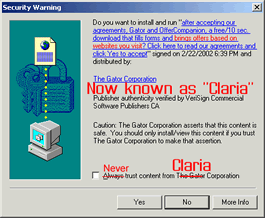March 15, 2005
More than 50 percent of Internet users have deleted the small files, which are deposited on computers to track their Web site habits. According to the Jupiter research firm's 2004 survey, as many as 39 percent may be deleting cookies from their primary computer on a monthly basis. The market researcher attributes the trend to heightened concern over privacy and security issues among Internet users. An increasing number of people are also using anti-spyware and firewall applications to decrease the inadvertent installation of the unwanted software. For online businesses, the trend means that cookies may not be an accurate method of tracking regular visitors to their Web sites. If users block cookies, accurate measurement is compromised and higher numbers may be categorized as anonymous, the study said. One generally agreed upon definition Spyware states that it that tracks your personal information (through the use of cookies) and transmits that information to third parties, (likely) without your consent. Keep in mind, that it can only send what it finds on your computer, spyware can’t read minds, yet it can be very obtrusive. Spyware and, Adware often installs itself alongside with software that you want to install on your PC, so read the fine print before you click 'next' or 'I agree'.

The Gator Corporation, known to serve up (cookie based) ads on infected PCs, also filed suit against several antispyware vendors in an attempt to clear its name. A popular Gator application was ‘Ewallet’. The Gator Ewallet, one of several applications that are distributed over the Internet was free, because it was ad-supported from the  network, in exchange for delivering advertising. While surfing the Web, you would gather cookies and then see GAIN branded ads (pop-ups and others) selected based on your online activities. On October 30, 2003, the company changed its name to Claria Corporation, but continues to operate in the same way it did before the name change. Gator/Claria products are often delivered to end-users by being bundled with other applications or through "drive-by downloads" that pop up an ActiveX dialog and start the installation process if you click "Yes", or “I agree” and, is generally very difficult to remove. Some of the more reputable applications will offer you a choice of installation methods. Choose 'Custom', that way you can see if there any choices to be made and can sometimes avoid things you may not want to install. network, in exchange for delivering advertising. While surfing the Web, you would gather cookies and then see GAIN branded ads (pop-ups and others) selected based on your online activities. On October 30, 2003, the company changed its name to Claria Corporation, but continues to operate in the same way it did before the name change. Gator/Claria products are often delivered to end-users by being bundled with other applications or through "drive-by downloads" that pop up an ActiveX dialog and start the installation process if you click "Yes", or “I agree” and, is generally very difficult to remove. Some of the more reputable applications will offer you a choice of installation methods. Choose 'Custom', that way you can see if there any choices to be made and can sometimes avoid things you may not want to install.
Gator applications include Ewallet, DateManager, WeatherScope, and PrecisionTime. Ewallet keeps track of the data you enter on web forms (including credit cards) so it can autofill the data for you later. DateManager provides appointment alarms and date reminders. WeatherScope shows the current and forecast weather. PrecisionTime keeps your system clock up to date. GAIN Publishing (GAIN stands for Gator Advertising Information Network) is the part of Gator/Claria that distributes the applications and includes the advertising software that is a part of all Gator Corporation applications. GAIN adware is also bundled as a part of several adware applications such as DivX Pro from DivX Networks.
According to a consumer survey quoted by Jupiter Research, 38 percent said they consider cookies invasive of their security and privacy. Lawmakers and consumer lobbies have been considering the impact of cookies, and network security company Netcraft on Monday pointed out the risks to personal information posed by the theft of cookies by attackers using cross-scripting flaws. The Consortium of Anti-Spyware Technology vendors (COAST), was a group founded by PestPatrol (Computer Associates), Webroot (SpySweeper), and Aluria (Spyware Eliminator). Among its goals, the consortium attempted to standardize the meaning of spyware, and the more positive sounding "ad-supported software" aka adware. Supporting software sponsors applications, such as a free version of Opera, and a multitude of other downloadable applications available on the Internet. Another goal of COAST was to sanction software as ‘spyware-free’ with its seal of approval. However, the process of taming various advertisers seeking to expose their products to as many eyes as possible proved impossible. In 16 months of existence, COAST expanded to include newer members that tended to play fast and loose with issues of privacy and information disclosure. By the beginning of February 2005, the promise of industry self-regulation appeared to have ended without any real success.
>>Next page
Related:
FTC Shuts Down Spyware Web Site
Phishing Hole Discovered in Internet Explorer
Avoiding a Phishing Attack
Phishing Flaw in Alternate Browsers
Hackers, Beyond the Browser
 
|

